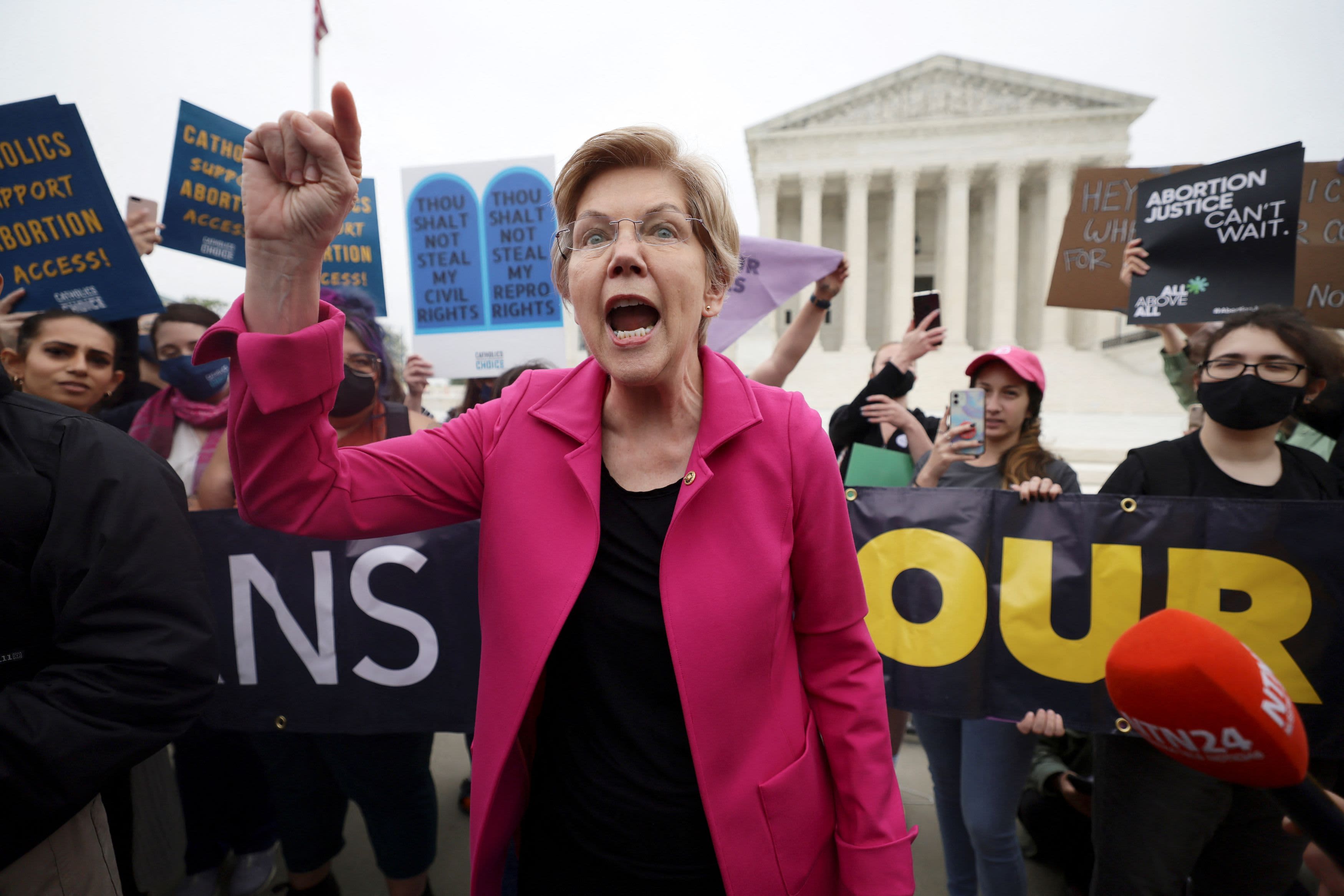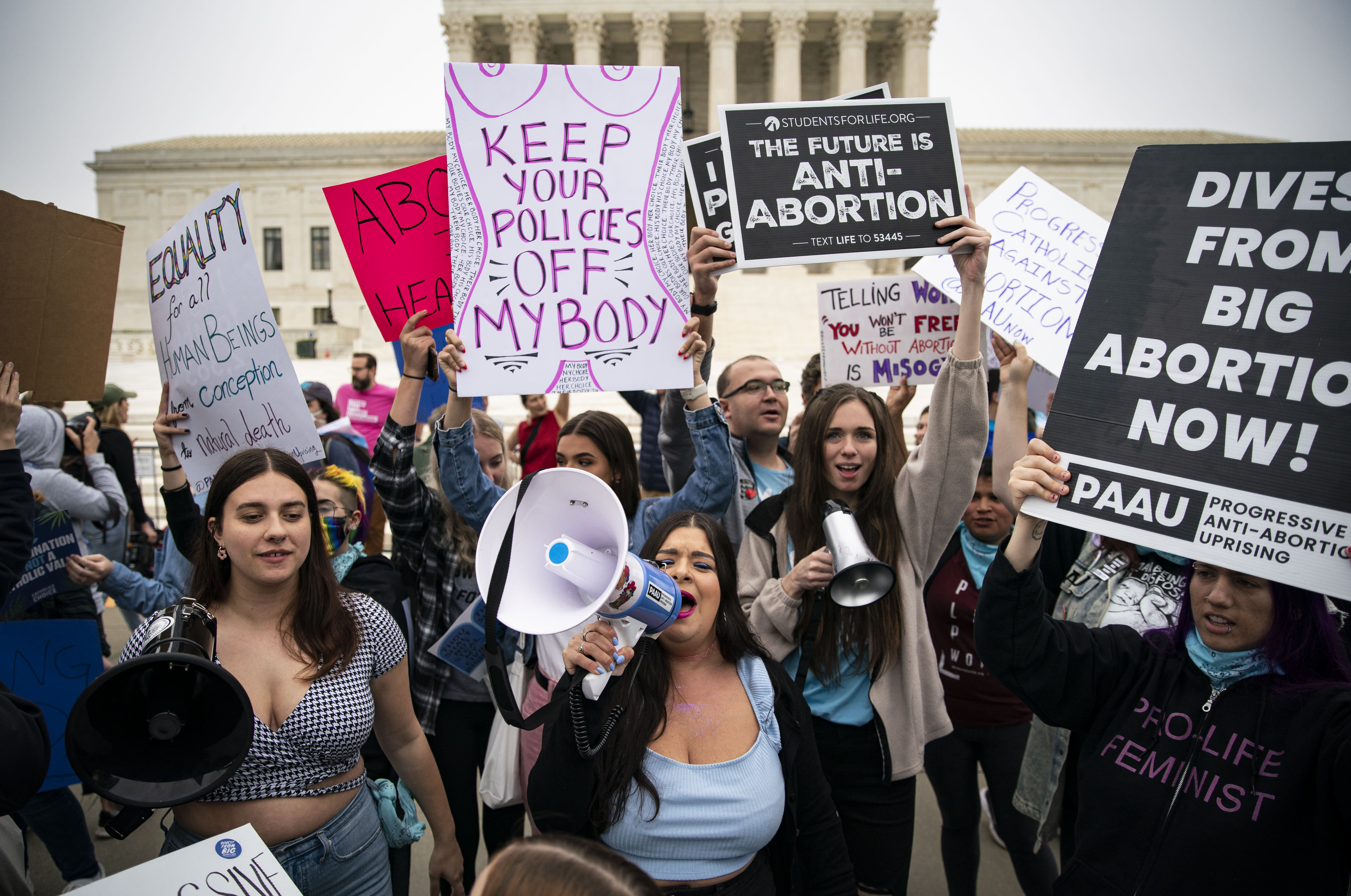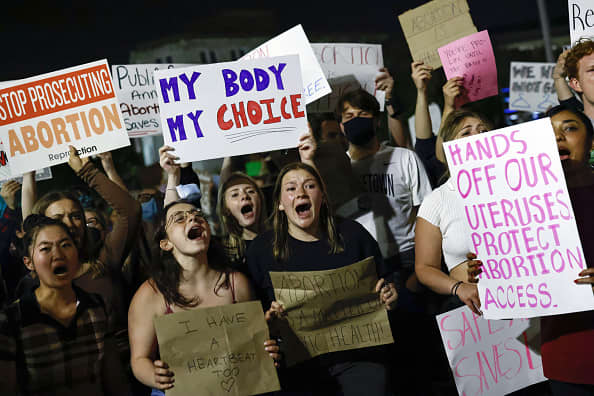If the U.S. Supreme Court follows through on overturning the landmark 1973 Roe v. Wade case that legalized abortion nationwide, it would quickly split the country into states with abortion access and those that outlaw it.
About half of U.S. states are expected to ban abortion if Roe falls, according to the abortion-rights think tank Guttmacher Institute. Twenty-two states, largely in the South and Midwest, already have total or near-total bans on the books. Aside from Texas, all are now blocked because of Roe.
Sixteen states and the District of Columbia, meanwhile, have protected access to abortion in state law, and several states moved to expand or strengthen those protections this year.
We've got the news you need to know to start your day. Sign up for the First & 4Most morning newsletter — delivered to your inbox daily. >Sign up here.
Here's a look at the laws and restrictions on abortion in D.C., Maryland and Virginia:
Washington, D.C., Abortion Laws
Abortion is legal in D.C. in all stages of pregnancy, including late-stage and third-trimester abortions. It’s considered to have one of the least restrictive abortion laws in the nation.
The D.C. Council has long supported reproductive rights and protections for health care workers who perform them. In 2017, it passed the Abortion Provider Non-Discrimination Amendment Act, an amendment to 1977’s D.C. Human Rights Act that made it illegal to discriminate against health care professionals for providing abortions or speaking publicly about their support for the procedure.
After the Supreme Court draft opinion leak, several Council members and the District’s non-voting House Del. Eleanor Holmes Norton pointed out that, despite overwhelming support, reproductive rights in the city are in a particularly vulnerable position if Roe were overturned due to the federal government's oversight of local D.C. laws and budget.
A Republican Congress, they argue, could try to restrict D.C.’s abortion rights. It has tried before. In 2015, the then Republican-controlled House of Representatives voted to strike down D.C. legislation that protected employees from facing discrimination based on their reproductive health decisions. And in 2017, the House also voted to prevent D.C. from using local tax revenue to subsidize abortions for low-income women, the Washington Post reported.
“So, you can bet your life that if this is the decision, I’m ready to fight,” Holmes Norton said in a news conference with Mayor Muriel Bowser at Planned Parenthood Tuesday afternoon. “Many states will be able to decide for themselves. Until the District gets statehood, we cannot make that decision for ourselves.”
“Washington, D.C., is a pro-choice city,” Bowser said. “Last night’s news didn’t change that. Women still have access to care in D.C. We’re ready to stand shoulder-to-shoulder with the hundreds of millions of Americans who share this value and share it deeply and are willing to fight for it and willing to protect it.”
“Make no mistake, a new Congress next year can come for reproductive rights in DC,” Councilman Charles Allen, who represents D.C.’s Ward 6, tweeted. “A lack of Statehood not only meant we had no vote on these Supreme Court justices, but the members that put them in could change our local laws. DC can’t be a bargaining chip again. #HandsOffDC.”
The D.C. Council has vowed to continue fighting to guarantee access to safe and legal abortions.
“In DC gov we are united keeping strong local law in place to protect safe access to abortion. @councilofdc, @mayorbowser & @EleanorNorton will work together to keep local law strong, provide access for women from elsewhere, protect health providers & fight Congressional meddling,” Council member Elissa Silverman said.
Ward 7 Councilman Vince Gray echoed this sentiment.
"The District of Columbia will preserve and protect the rights of women to make healthcare choices for themselves. Period," Gray said in a statement. He called on Democratic legislators to end the filibuster in the Senate, which he said would allow the passage of the Women’s Health Protection Act and D.C. statehood.
Maryland Abortion Laws
Abortion is legal in Maryland. People can choose to terminate a pregnancy until the fetus is considered viable by a doctor.
According to the pro-abortion rights Guttmacher Institute, Maryland has two notable restrictions on abortions. First, abortions can only be performed after the point of viability if the mother’s life or health is in danger or if the fetus has a genetic defect, serious deformity or abnormality. Second, caregivers of a minor seeking an abortion must be notified.
Abortion access is protected under Maryland’s current laws — so the procedure would remain legal if Roe v. Wade was overturned and federal protections ended.
Maryland voters approved a referendum in 1992 “to prohibit State interference with woman's abortion decision before fetus is viable or, under certain conditions, at any time.”
Maryland lawmakers recently moved to expand abortion access. Beginning July 1, 2022, nurse practitioners, nurse midwives and physician assistants to provide them with training.
The General Assembly overrode Republican Gov. Larry Hogan’s veto of that bill in April.
Virginia Abortion Laws
In Virginia, the prospect of Roe being overturned puts an even sharper focus on the divided General Assembly and on a governor who’s voiced strong opposition to current abortion law.
Abortions are legal in Virginia in the first and second trimesters. Abortions are legal in the third trimester if continuing the pregnancy “is likely to result in the death of the woman or substantially and irremediably impair the mental or physical health of the woman.”
The following abortion restrictions are in place in Virginia, according to the Guttmacher Institute:
- Abortion is covered in insurance policies for public employees only in cases of life endangerment, rape, incest or fetal impairment.
- The parent of a minor must consent and be notified before an abortion is provided.
- Public funding is available for abortion only in cases of life endangerment, rape, incest or fetal impairment.
With Republicans controlling the Virginia House and Democrats the Senate lawmakers steered away from trying to make changes in abortion law last session. But if the Supreme Court does overturn Roe, then 2023 could be a very pivotal year on the issue of abortion rights.
Youngkin avoided talk of any specifics as he reacted to news of the leaked opinion.
“I am pro-life and I have been very clear about that since the day I launched my campaign,” he said in a statement. “While we wait for the final June decision, we will be focused on lowering taxes for Virginians, funding education and law enforcement because we need to get a budget passed.”
He said he does support any ruling that would give states full authority to decide on abortion restrictions.
“I do support the fact that this should be a state decision,” Youngkin said. “That state decision is one we’re going to have to work with our legislature on what we do, and as I’ve said, I think that there’s common ground on this.”
Virginia Senate Democrats reaffirmed their promise to be a brick wall against any new restrictions. Sen. Barbara Favola reminded that even if Roe is overturned, current Virginia law protects abortion rights.
“I think women in Virginia need to know that access to abortion care is legal in Virginia,” she said. “We have made it, in some respects, easier to access abortion care.”
And Favola said Democrats will work even harder to make sure Virginia voters understand there would be consequences in 2023 if Republicans regained control of both the House and Senate.
“If people really care about it, they’re going to have to help the Democrats in this brick wall, be a brick wall, continue to be a brick wall,” she said.
Virginia voters will cast ballots in November 2023 for all 140 House and Senate seats, but action on legislation could come as soon as next session.
There is one Democratic senator who’s indicated he may be open to some greater restriction on abortion.
Virginia-based Students for Life has been labeling itself themselves the post-Roe generation for months. Now, for Norvilia Etienne and other members, the leaked draft opinion suggests their highest hope may soon become reality.
“I would hope it that would become a pro-life state and that Gov. Youngkin would act on what we elected him to do,” Etienne said.
Etienne says if Roe is overturned, she expects Youngkin to lead the way in enacting new restrictions.




